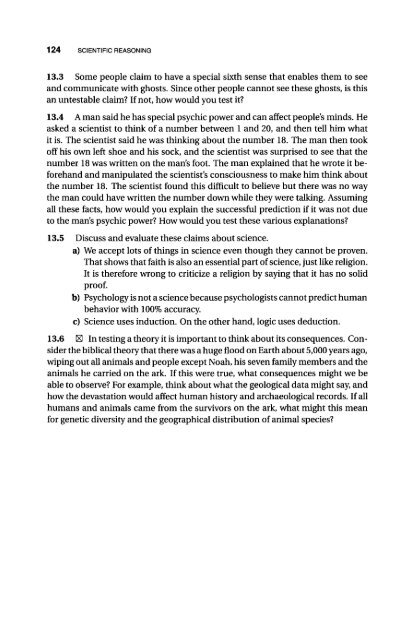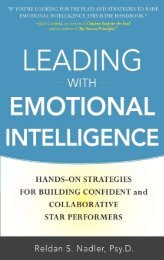An Introduction to Critical Thinking and Creativity - always yours
An Introduction to Critical Thinking and Creativity - always yours
An Introduction to Critical Thinking and Creativity - always yours
You also want an ePaper? Increase the reach of your titles
YUMPU automatically turns print PDFs into web optimized ePapers that Google loves.
124 SCIENTIFIC REASONING<br />
13.3 Some people claim <strong>to</strong> have a special sixth sense that enables them <strong>to</strong> see<br />
<strong>and</strong> communicate with ghosts. Since other people cannot see these ghosts, is this<br />
an untestable claim? If not, how would you test it?<br />
13.4 A man said he has special psychic power <strong>and</strong> can affect people's minds. He<br />
asked a scientist <strong>to</strong> think of a number between 1 <strong>and</strong> 20, <strong>and</strong> then tell him what<br />
it is. The scientist said he was thinking about the number 18. The man then <strong>to</strong>ok<br />
off his own left shoe <strong>and</strong> his sock, <strong>and</strong> the scientist was surprised <strong>to</strong> see that the<br />
number 18 was written on the man's foot. The man explained that he wrote it beforeh<strong>and</strong><br />
<strong>and</strong> manipulated the scientist's consciousness <strong>to</strong> make him think about<br />
the number 18. The scientist found this difficult <strong>to</strong> believe but there was no way<br />
the man could have written the number down while they were talking. Assuming<br />
all these facts, how would you explain the successful prediction if it was not due<br />
<strong>to</strong> the man's psychic power? How would you test these various explanations?<br />
13.5 Discuss <strong>and</strong> evaluate these claims about science.<br />
a) We accept lots of things in science even though they cannot be proven.<br />
That shows that faith is also an essential part of science, just like religion.<br />
It is therefore wrong <strong>to</strong> criticize a religion by saying that it has no solid<br />
proof.<br />
b) Psychology is not a science because psychologists cannot predict human<br />
behavior with 100% accuracy.<br />
c) Science uses induction. On the other h<strong>and</strong>, logic uses deduction.<br />
13.6 Kl In testing a theory it is important <strong>to</strong> think about its consequences. Consider<br />
the biblical theory that there was a huge flood on Earth about 5,000 years ago,<br />
wiping out all animals <strong>and</strong> people except Noah, his seven family members <strong>and</strong> the<br />
animals he carried on the ark. If this were true, what consequences might we be<br />
able <strong>to</strong> observe? For example, think about what the geological data might say, <strong>and</strong><br />
how the devastation would affect human his<strong>to</strong>ry <strong>and</strong> archaeological records. If all<br />
humans <strong>and</strong> animals came from the survivors on the ark, what might this mean<br />
for genetic diversity <strong>and</strong> the geographical distribution of animal species?
















